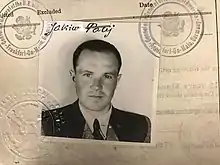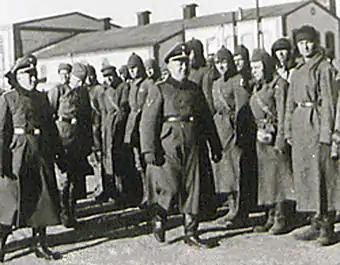Jakiw Palij
Jakiw "Jakob" Palij (Yah-keev PAH’-lee;[1] 16 August 1923 – 10 January 2019) was a Polish Ukrainian[2] war criminal who, after the war, became an American citizen and lived most of his life in the United States until his 2018 deportation to Germany at an advanced age.[3]
Jakiw Palij | |
|---|---|
 Palij's visa photo, 1949 | |
| Born | 16 August 1923 |
| Died | 10 January 2019 (aged 95) |
| Occupation | Draftsman |
| Spouse(s) | Maria |
| Military career | |
| Service/ | |
Early life
Jakiw Palij was born on 16 August 1923 in the town of Piadyki, in what was then eastern Poland and is now in the Ivano-Frankivsk Oblast of western Ukraine. At the outbreak of World War II, in 1939, Soviet troops moved in to occupy his home town, along with other Polish territory, in accordance with the terms of the Molotov–Ribbentrop Pact. In June 1941, when the Germans attacked the Soviet Union, the town was captured by the Nazi troops.[3]
Wartime service

After occupying Poland, Germany built labor camps in the country, one of which was run by the SS in Trawniki.[4] The camp initially served as an Auffanglager für Flüchtlinge, a holding center for refugees, and then turned into the SS-Ausbildungslager-Trawniki training facility. There, Polish volunteers were trained by the SS and then enlisted as auxiliaries, colloquially called Hiwis.[5]
Trawniki became an Operation Reinhard extermination camp and mass executions of prisoners were undertaken there too, committed mostly by the Polish Hiwis, as well as by Germans. At each of these camps, Trawniki Hiwis served as the Sonderkommando guard units. They also acted as gas chambers operators. Almost all Trawniki guards were involved in shooting, beating, and terrorizing Jews.[6] The Russian historian Sergei Kudryashov, who made a study of the Trawniki men serving at death camps, claimed that there was little sign among them of attraction to National Socialism ideals and that most had volunteered in order to leave the POW camps and/or because of self-interest.[6] On the other hand, Holocaust historian Christopher R. Browning wrote that Hiwis "were screened on the basis of their anti-Communist beliefs and hence almost invariably were anti-Semites."[7]
According to documents presented subsequently in his deportation trials, Palij served in the Streibel Battalion, guarding forced laborers who made uniforms and brushes. On 2 November 1943, an estimated 6,000 Jews at the camp were executed in a single day, a mass murder rated by Browning to have been “the largest killing operation against Jews in the entire war.”[7][8]
Emigration to the United States
After Germany's defeat in 1945, Palij stayed in Poland. On 30 April 1948, another Piadyki-born camp guard, listed in Soviet military records as Nikolaj Gutsulyak or Mykola Hutsulyak, revealed to the Soviet authorities that he'd served with Palij at the Trawniki extermination camp.[3] In early 1949, and not having yet been traced by the Soviets, Palij, without disclosing his wartime service as an SS-auxiliary, submitted a request to the US Displaced Persons Commission asking to be designated a "displaced person" eligible to emigrate to the United States. He provided the American authorities with a false timeline of his life during the war, claiming he'd worked on his father’s farm in Piadyki, and that he subsequently worked in a farm and a factory in Germany.[8]
Palij obtained the requested visa and, traveling from Bremerhaven, Germany, on the Gen. Heintzelman, a US military-transport ship, arrived in the Boston harbor in July 1949. On the same vessel were also two other men who would be subsequently hunted by American officials for their wartime activities.[note 1]
Deportation to Germany
In 1993, investigators from the U.S Justice Department's Human Rights and Special Prosecution Section found the name of Jakiw Palij in an old Nazi roster. A fellow former guard was contacted and he testified that Palij was “living somewhere in America.”[1] The investigators located him in Queens, New York City, where he was working as a draftsman and living in a "second-story apartment in a modest red-brick duplex"[9] with his wife Maria who had since died,[10] an apartment that was "unwittingly" sold to him by a Holocaust survivor.[11] In 2001, Palij admitted to the American authorities that he had lied in his original request for emigration to the States.[12] In 2003, his American citizenship was revoked[13] and in 2004, a federal judge issued an order of deportation against him.[14] In his decisions, issued on 10 June and 23 August 2004, U.S. Immigration Judge Robert Owens ordered Palij’s deportation to "Ukraine, Poland or Germany, or any other country that would admit him," on the basis of his "participation in Nazi-sponsored acts of persecution while serving during World War II as an armed guard at the Trawniki forced-labor camp in Nazi-occupied Poland under the direction of the government of Germany and his subsequent concealment of that service when he immigrated to the United States." Judge Owens wrote also that the Jews massacred at Trawniki “had spent at least half a year in camps guarded by Trawniki-trained men, including Jakiw Palij.” In December 2005, the Board of Immigration Appeals denied Palij’s appeal.[15] Palij, in his court filings, repeatedly denied any wrongdoing, claiming that he and other young men from his Polish hometown were "coerced" into working for the "Nazi occupiers."[9]
According to subsequent State Department statements, "difficult conversations"[1] ensued between the United States and the three European countries to which he could be sent, Germany, Poland, or Ukraine, since none of them would concede to accept Palij.[9]
In 2015, the Würzburg Public Prosecutor's Office in Germany undertook a preliminary investigation on Palij and a formal one in July 2016 but subsequently announced that the evidence against the suspect was "insufficient to accuse him of complicity in murder."[12] During the time his deportation was pending, Palij continued to live in his Jackson Heights apartment in New York city, in front of which protests and demonstrations against his presence there were taking place regularly. Palij stated to the media that he had "become used to the protests" and did not expect any country to accept "an 80-year-old man in poor health.”[16]
In 2018, the German government approved Palij's entry into the country, its representative stating that the decision was taken "although the former guard of a Nazi labor camp was never a German citizen" and that "there [had been] no evidence that he was involved in Nazi crimes."[17] Foreign Minister Heiko Maas said to the media[18]
We face the moral obligation of Germany, in whose name the worst injustice was done under the Nazis. The task that grows for us from our history includes coming to terms with and honestly dealing with the crimes of the Nazi reign of terror. This also includes the compass of our Basic Law with the unconditional priority of human dignity and responsibility for the rule of law. On the basis of this belief, we take responsibility towards the victims of National Socialism as well as our international partners - even if this sometimes demands difficult political considerations.
On 21 August 2018, ICE agents raided the Palij residence in Queens,[19] apprehended the 95-year-old deportee, and put him on a US government-chartered air ambulance that departed from Teterboro Airport, New Jersey, and took its passengers to Dusseldorf, Germany, arriving there early in the morning at local time.[1] The German government announced that Palij would reside in a retirement home in the town of Ahlen.[1]
The US authorities subsequently declared that Palij had been the last known Nazi suspect living in the United States.[2][19]
Death
On 10 January 2019, it was announced that Palij, a resident of the Ahlen care facility since his arrival in Germany, had died that morning "from natural causes", at the age of 95.[20]
Notes
- According to the New York Times 2019 article, one of them died in Queens in 2007 with a case pending against him while the other was stripped of his citizenship in 2001 and died in Florida nine years later.
References
- Sisak, Michael R.; Rising, David; Herschaft, Randy (22 August 2018). "US deports 95-year-old ex-Nazi guard to Germany". Associated Press. Retrieved 20 October 2020.
- Rising, David (11 January 2019). "The last Nazi in America: Camp guard deported by US last year dies in Germany". The Times of Israel. Retrieved 24 December 2020.
Palij, an ethnic Ukrainian born in a part of Poland that is now Ukraine...
- Sisak, Michael R.; Herschaft, Randy (12 January 2019). "Timeline: Life and death of ex-Nazi guard deported from US". The Times of Israel. Retrieved 18 October 2020.
- "Jakiw Palij: Nazi guard deported by US dies in Germany". BBC. 10 January 2019. Retrieved 18 October 2020.
- Jabłoński, Stanisław. "Hitlerowski obóz w Trawnikach" [The Hitlerite camp in Trawniki] (in Polish). Trawniki official website. Retrieved 18 October 2020.
- Kudryashov, Sergei (2007). "Ordinary Collaborators: The Case of the Travniki Guards". In Erickson, Ljubica; Erickson, Mark (eds.). Russia: War, Peace and Diplomacy - Essays in Honour of John Erickson (PDF). Weidenfeld & Nicolson. ISBN 978-0297849131. Retrieved 18 October 2020.
- Browning, Christopher R. (1998) [1992]. "Arrival in Poland". Ordinary Men: Reserve Police Battalion 101 and the Final Solution in Poland (PDF). Penguin Books. pp. 52, 77, 79, 80, 135. Retrieved 18 October 2020.
Also: PDF cache archived by WebCite.
- Yuhas, Alan (10 January 2019). "Jakiw Palij, Former Nazi Guard Deported After Decades in U.S., Dies at 95". The New York Times. Retrieved 18 October 2020.
- Perez, Evan; Rosen, Alexander; Bruer, Wesley; Moorhead, Jeremy; Lee, Alex; Gaynor, Josh (28 January 2016). "U.S. Nazi hunter has one active case". CNN. Retrieved 18 October 2020.
- Nir, Sarah Maslin; Winston, Ali (21 August 2018). "This Man Deserves What He Gets: In Queens, a Nazi's Long Flight From Justice Ends". The New York Times. Retrieved 1 November 2020.
- O'Leary, Abigail; Coles, Amy (22 August 2018). "Holocaust survivor unwittingly sold his home to 'Nazi behind massacre of 6,000 Jews' living under false identity in USA". The Daily Mirror. Retrieved 1 November 2020.
- "Mutmaßlicher KZ-Aufseher bleibt wohl straffrei" [Alleged concentration camp guard likely to remain unpunished]. Die Zeit (in German). 3 November 2018. Retrieved 1 December 2020.
- Fieldstadt, Elisha (11 January 2019). "Former Nazi guard, Jakiw Palij, who spent decades living in U.S. before deportation dies". NBC News. Retrieved 18 October 2020.
- "Former Nazi concentration camp guard Jakiw Palij dies in Germany". Deutsche Welle. 2020. Retrieved 18 October 2020.
- "Former Nazi Labor Camp Guard Jakiw Palij Removed to Germany". The United States Department of Justice. 21 August 2018. Retrieved 20 October 2020.
- Hartmann, Margaret (11 November 2013). "Former Nazi Still Resides in Queens, Despite Decade of Protests". New York Magazine. Retrieved 18 October 2020.
- "SS-Mann gelangte als 'NS-Verfolgter' in die USA" [SS men arrived in the USA as 'persecuted by the Nazis']. Die Welt (in German). 23 August 2018. Retrieved 18 October 2020.
- Bubrowski, Helene; Burger, Reiner (21 August 2018). "Amerika schiebt KZ-Aufseher nach Deutschland ab" [America deports concentration camp guard to Germany]. Frankfurter Allgemeine Zeitung (in German). Frankfurt am Main. Retrieved 20 October 2020.
- Hart, Benjamin (21 August 2018). "ICE Deports Last Known Nazi Collaborator Living in America". New York Magazine. Retrieved 18 October 2020.
- "Ex-Nazi prison guard deported by US dies in Germany aged 95". The Guardian. Agence France-Presse. 10 January 2019. Retrieved 18 October 2020.
External links
- Human Rights and Special Prosecution Section at the U.S Justice Department's official website
- Di Fabio, Udo (2020). "Opinion: The significance of Germany's Basic Law". Deutsche Welle. Retrieved 20 October 2020.
